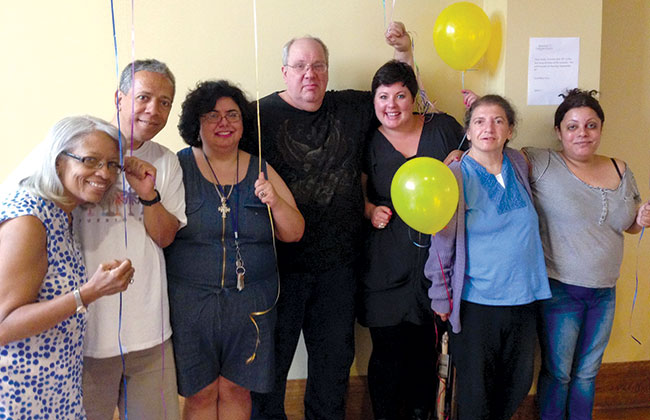Each Saturday, West End Collegiate Church invites people who need mental or emotional healing to gather for food, fellowship, and a discussion on faith.
Each Saturday, West End Collegiate Church in New York City invites those who need mental or emotional healing to gather for food, fellowship, and a discussion on faith. It’s called the Saturday Center.
While the Saturday Center group is different than a traditional congregation, it’s not for the reasons you might think.
“There’s an honesty that happens at the Saturday Center,” says associate pastor Jes Kast-Keat, who leads the group in Bible study and worship each week. “We just kind of cut through things in order to get to the essence of why we’re here, how God made us, and what does Jesus have to say to us today.”
The answers to those questions can be surprising.
A few years ago, the Saturday Center group discussed the angel Gabriel’s announcement to Mary that she would give birth to Jesus. During the conversation, a woman who had severe hallucinations asked, “Pastor Jes, do you think Mary could have been hallucinating?”
“What would that mean to you—if Mary was hallucinating?” Kast-Keat asked.
“That would mean that God might want to use me and my hallucination,” the woman said.
“I love that type of creativity in Scripture,” says Kast-Keat. “Now this person who hallucinates, who is often overlooked by society, she now feels [like she has] a place in the story of God—that her voice and her story might be found in Scripture, and that God might want to use her today. That’s profound. That provides meaning and hope in someone’s life.”
Participating in the Saturday Center has also brought new meaning to Kast-Keat’s spiritual life.
“It’s been really rich to look at the text through the eyes of someone who hallucinates, or through the eyes of someone who struggles with depression—severe depression—or through the eyes of someone who has schizophrenia,” says Kast-Keat. “The text comes alive very differently.
“I tell [the Saturday Center group], more and more, how energizing their own ways of engaging Scripture and the faith have been for me. There’s been a really beautiful mutual reciprocity that we’ve grown into.”
Affirmation like this is rare outside of the Saturday Center for many of the regulars.
“Too often,” says Kast-Keat, “the messages they receive—whether it be from the media, or from the subway, or from their families—the messages are that they’re not good enough, or they’re not loveable, or they’re not smart enough.”
Even churches often struggle to embrace those who experience mental illness. That’s why Kast-Keat believes it’s so important for the Saturday Center to send a different message.
“Saturday Center is a place where [people with mental illnesses] can come, and the message is, ‘You are loved. You are loved as you are. There is nothing more you can do. God loves you, and we love you,’” says Kast-Keat. “The other things that they’ve heard in their own lives are pretty loud, so the message of love needs to be louder.”
That message of love is already having an impact. Many members of the Saturday Center group have been coming every week for years—some since it started in the 1980s. The small, tightly knit group even exchanges birthday presents and celebrates holidays together.
“Illnesses are part of our congregation, but they also are not the full identity of our congregation,” says Kast-Keat. “There’s joy when we’re together. There’s a sense of ‘we’re not alone.’ There’s belonging. There’s love and care…It’s a beautiful little congregation.”
[Photo courtesy West End Collegiate Church]





